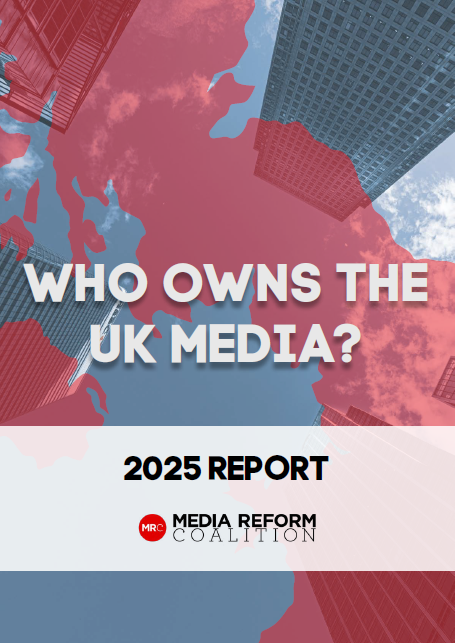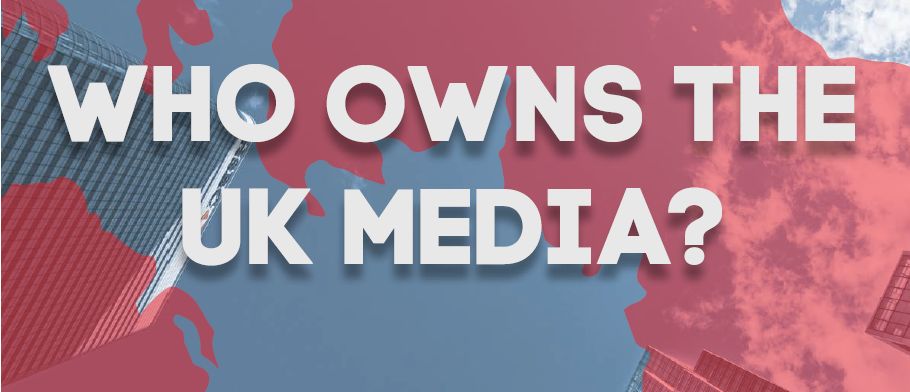The Media Reform Coalition has published a new edition of its flagship ‘Who Owns the UK Media?’ report, highlighting the dangerous levels of concentrated ownership across the UK’s national and local newspapers, broadcasters and tech platforms.
READ: Who Owns The UK Media? 2025 Report
This report is the 8th edition of Who Owns The UK Media?, and shows that our media system is in a perilous state due to the ongoing collapse in media plurality and the declining diversity of news sources.
Since our last report in 2023, the largest media companies have cemented and expanded their dominant market positions. Unchecked media mergers and corporate takeovers have contributed to the worsening concentration of media ownership in the UK, while the opaque and unaccountable influence that a few Big Tech platforms exert on UK media poses serious challenges for independent journalism and our digital rights.
Key findings at a glance:
- 7 of the top 15 online platforms used to access news in the UK are controlled by Meta, Google and X Corp. Google commands 93% of UK search engine use, while Meta and Google together account for three-fifths of all UK advertising spend, giving these two Big Tech companies unrivalled control over how news is found, accessed and funded online.
- Just three companies – DMG Media, News UK and Reach – control 90% of UK national newspaper circulation, a 20% increase in market concentration since 2014. These same three companies account for over 40% of the combined reach of the UK’s top 50 online newsbrands, giving these publishers significant power to set and steer the national news agenda.
- The UK’s local newspapers are dominated by a tiny handful of corporate chain publishers, with just 2 companies – Newsquest and National World – controlling 51% of the UK’s 882 local newspapers and online local news websites. More than 8 out of 10 Local Democracy Reporters, funded by the TV licence fee to restore local journalism, are contracted to Newsquest, Reach and National World – and these same companies control local newspaper monopolies in areas covering 11.6 million people.
- In commercial radio, just two companies – Bauer and Global – own two-thirds of the UK’s national DAB radio stations, and more than 60% of local analogue stations. Bauer, Global and News Broadcasting (owned by publishers News UK) together control more than three-quarters of the UK’s national DAB radio market.
- Netflix, Amazon Prime and Disney+ account for 75% of all UK video-on-demand subscriptions. Almost half of the value of TV commissions by the UK’s major broadcasters went to just 12 companies, despite these largest producers making up only 4% of the entire UK independent production sector.

READ: Who Owns the UK Media? 2025 Report
The findings in this report, together with our Media Manifesto, demonstrate the urgent need for radical media reform. Government, regulators and Parliament must act to break up the corporate media giants and unaccountable tech platforms that dominate the UK, to protect against further losses in media plurality and diversity, and to create new models for funding and supporting a genuinely independent, accountable and democratic media commons.
The Media Reform Coalition believes that media plurality is not a luxury in the digital age but an essential part of a media system in which vested interests should not be allowed to dominate. We want to see truly free and independent media that holds power to account and to serve the public as opposed to benefitting shareholders, proprietors or like-minded politicians.
Unaccountable concentrations of media power are amongst the greatest threats to a free and open democratic society. We need a proactive, future-proof framework for media plurality that supports a greater diversity of media owners, and public interest reforms to promote and uphold the highest standards in journalism:
- New laws to create clear thresholds for triggering interventions on media ownership, both in and outside of active merger situations, as well as explicit detailed guidance on remedies for breaking down concentrations of media ownership – such as public interest obligations, structural separation of editorial and corporate functions, and forced divestment of assets.
- Updating how Ofcom measures media plurality to properly account for the role of online intermediaries like Facebook, Google and X / Twitter in expanding and entrenching the market reach of dominant media outlets.
- Expanding the ‘fit and proper persons’ test – currently only applied to takeovers involving broadcasting licences – to mergers involving any UK media enterprise. This would require that any media owner seeking to acquire or expand a market position in UK media demonstrates a genuine and sustained commitment to high standards of journalism, editorial and journalistic independence, a clear record of regulatory compliance, and effective ethical corporate governance.
- Requiring that Big Tech companies like Meta and Alphabet actively promote and protect plurality and diversity on the digital platforms they control. Any effective plurality regime must grapple with the all-encompassing impact of dominant tech platforms in shaping how news is prioritised and presented for UK audiences.
At a time of intensifying political instability and widening economic inequalities, we urgently need a programme of genuinely progressive reform aimed at creating a freer, fairer and more accountable media. And if we want to lay the foundations for a media system that serves and represents the full diversity of the UK population, its opinions, its communities, its constituent nations and indeed its divisions, then we need to take action now to curb media power.
Big Tech corporations and global media moguls are a direct threat to a healthy and free democracy, and all signs show that these forces are mobilising against the basic foundations and major institutions that seek to guard against excessive concentrations of power.
This government may not get another chance – are they brave enough to put genuine democratic media reform at the heart of their mission to change Britain?
READ: Who Owns the UK Media? 2025 Report
DOWNLOAD: Data sheets for Who Owns the UK Media? 2025 Report
This edition of the Who Owns The UK Media? report was funded by an award from the Barry Amiel & Norman Melburn Trust.




